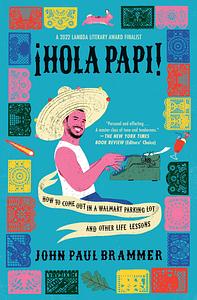Take a photo of a barcode or cover
1.05k reviews for:
Hola Papi: How to Come Out in a Walmart Parking Lot and Other Life Lessons
John Paul Brammer
1.05k reviews for:
Hola Papi: How to Come Out in a Walmart Parking Lot and Other Life Lessons
John Paul Brammer
emotional
funny
hopeful
lighthearted
reflective
medium-paced
reflective
fast-paced
challenging
funny
hopeful
inspiring
reflective
medium-paced
challenging
emotional
funny
informative
inspiring
lighthearted
reflective
sad
tense
medium-paced
An unexpected treasure. I picked this book up because I thought it would be light and fun (it wasn’t), but it is poignant and raw and beautiful.
I would have ranked it higher, but some parts were not easy or fun to read because I have experienced some very similar trauma in my life.
Annnnnyway, Brammer is a wonderful author. There is a depth and weight to his words, and his thoughtful observations on sex, sexuality, love, life, and growth make for a powerful and inspiring story. I hugely related to this book and feel like I learned a lot about myself through his journey.
I would have ranked it higher, but some parts were not easy or fun to read because I have experienced some very similar trauma in my life.
Annnnnyway, Brammer is a wonderful author. There is a depth and weight to his words, and his thoughtful observations on sex, sexuality, love, life, and growth make for a powerful and inspiring story. I hugely related to this book and feel like I learned a lot about myself through his journey.
Graphic: Fatphobia, Homophobia, Racial slurs, Racism, Sexual assault, Suicidal thoughts, Toxic relationship, Suicide attempt, Sexual harassment, Classism
I’m glad I read this book. It was a great dive into a new perspective. The writer was very talented and I enjoyed reading these words. I think mature high school students may be able to use this book to help with perspective or representation, but I would most especially recommend this book to young adults.
Teachers/Parents Prepare Readers for:
SA
Suicidal thoughts
Sexual scenes
LGBTQ+ themes
Racial themes
Teachers/Parents Prepare Readers for:
SA
Suicidal thoughts
Sexual scenes
LGBTQ+ themes
Racial themes
Not a bad book, but I went into it expecting it to be funny and a lot of it was really sad. Just not the vibe I’m looking for right now
emotional
funny
reflective
fast-paced
I adore ¡Hola Papi!. John Paul Brammer is a gift
Hola Papi is a collection of essays spurred on by advice column questions and responses. John Paul Brammer grew up in small town Oklahoma as a mixed race gay kid. He experienced his share of bullying, which caused him to change middle schools. Later he found himself working as the writer of the Hola Papi advice column for a Grindr-owned online publication. There he answers questions from gay men looking for advice about coming out or their new relationships, and more. All of this is done with a pinch of humor and self-deprecation. Brammer recounts his own awkward encounters, self-discovery, love found and lost.
I listened to the audiobook, which Brammer narrated himself and he came across as warm and approachable. I appreciated his insight into his life as a less than 100% confident gay man and his desire to help the younger generation of gay men learn from his experience.
Thank you to the publisher for the review copy!
I listened to the audiobook, which Brammer narrated himself and he came across as warm and approachable. I appreciated his insight into his life as a less than 100% confident gay man and his desire to help the younger generation of gay men learn from his experience.
Thank you to the publisher for the review copy!
memoir-in-essays are generally appealing to me and this one was pretty good! i do think JPB has some genuinely thoughtful and well-meaning advice to give through these chapters. there were some bits i was pleasantly surprised by.
i have two main critiques, one surface-level and one more significant. because he writes an advice column, each chapter is formatted as such, beginning with a (maybe faux or heavily clipped?) letter from a reader. through the whole rest of the chapter, JPB will randomly insert the letter’s sign-off into a sentence or seven. and every time, it threw me off, bc the tone of each essay is really more memoir than advice column to me. it was just a mildly irritating writing quirk that i’m sure some people enjoy but was just not for me. regardless that alone wouldn’t put this at a 4-star.
what did is that pretty often, JPB gives advice or comes to some grand conclusion that is /SO CLOSE/ to being something radical or truly politically meaningful, and then it just doesn’t happen. at one point he very clearly describes the invisible knapsack conception of white privilege, but then just moves on and writes about smth else. it’s definitely possible that he came up with the same ideas himself, but it’s an idea that dates back to 1980s antiracism so to read it as if it’s novel was odd. there were a few other similar instances that all just made me think “no!! u were so close to something really good!!!!”
I know i’m a very critical reader but cmon, just a /little/ more radical, please?
i have two main critiques, one surface-level and one more significant. because he writes an advice column, each chapter is formatted as such, beginning with a (maybe faux or heavily clipped?) letter from a reader. through the whole rest of the chapter, JPB will randomly insert the letter’s sign-off into a sentence or seven. and every time, it threw me off, bc the tone of each essay is really more memoir than advice column to me. it was just a mildly irritating writing quirk that i’m sure some people enjoy but was just not for me. regardless that alone wouldn’t put this at a 4-star.
what did is that pretty often, JPB gives advice or comes to some grand conclusion that is /SO CLOSE/ to being something radical or truly politically meaningful, and then it just doesn’t happen. at one point he very clearly describes the invisible knapsack conception of white privilege, but then just moves on and writes about smth else. it’s definitely possible that he came up with the same ideas himself, but it’s an idea that dates back to 1980s antiracism so to read it as if it’s novel was odd. there were a few other similar instances that all just made me think “no!! u were so close to something really good!!!!”
I know i’m a very critical reader but cmon, just a /little/ more radical, please?






